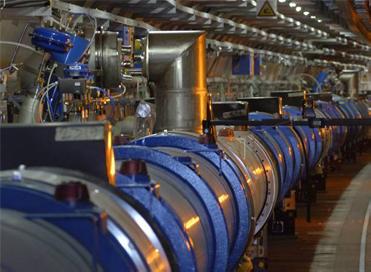
GENEVA (BNS): Shutdown of the Large Hadron Collider last week following a helium leak in its tunnel was a psychological blow, admitted its operators. It would restart
only early next year, they said.
"Coming immediately after the very successful start of LHC operation on September 10, this is undoubtedly a psychological blow," the European Organization for Nuclear Research (CERN) Director General Robert Aymar said.
"Nevertheless, the success of the LHC's first operation with beam is testimony to years of painstaking preparation and the skill of the teams involved in building and running CERN's accelerator complex. I have no doubt that we will overcome this setback with the same degree of rigour and application," Aymar said.
Investigations following a large helium leak into sector 3-4 of the LHC tunnel have indicated that the most likely cause of the incident was a faulty electrical connection between two of the accelerator's magnets, a statement said.
According to CERN, before a full understanding of the incident can be established, however, the sector has to be brought to room temperature and the magnets involved opened up for inspection. This will take three to four weeks. Full details of this investigation will be made available once it is complete.
The time necessary for the investigation and repairs precludes a restart before CERN's obligatory winter maintenance period, bringing the date for restart of the accelerator complex to early spring 2009. LHC beams will then follow, the statement said.
Particle accelerators such as the LHC are unique machines, built at the cutting edge of technology. Each is its own prototype, and teething troubles at the start-up phase are therefore always possible, the CERN statement explained.
"The LHC is a very complex instrument, huge in scale and pushing technological limits in many areas," said Peter Limon, who was responsible for commissioning the world's first large-scale super conducting accelerator, the Tevatron at Fermilab in the USA. “Events occur from time to time that temporarily stop operations, for shorter or longer periods, especially during the early phases."
 Previous Article
Previous Article Next Article
Next Article












The Indian Air Force, in its flight trials evaluation report submitted before the Defence Ministry l..
view articleAn insight into the Medium Multi-Role Combat Aircraft competition...
view articleSky enthusiasts can now spot the International Space Station (ISS) commanded by Indian-American astr..
view article